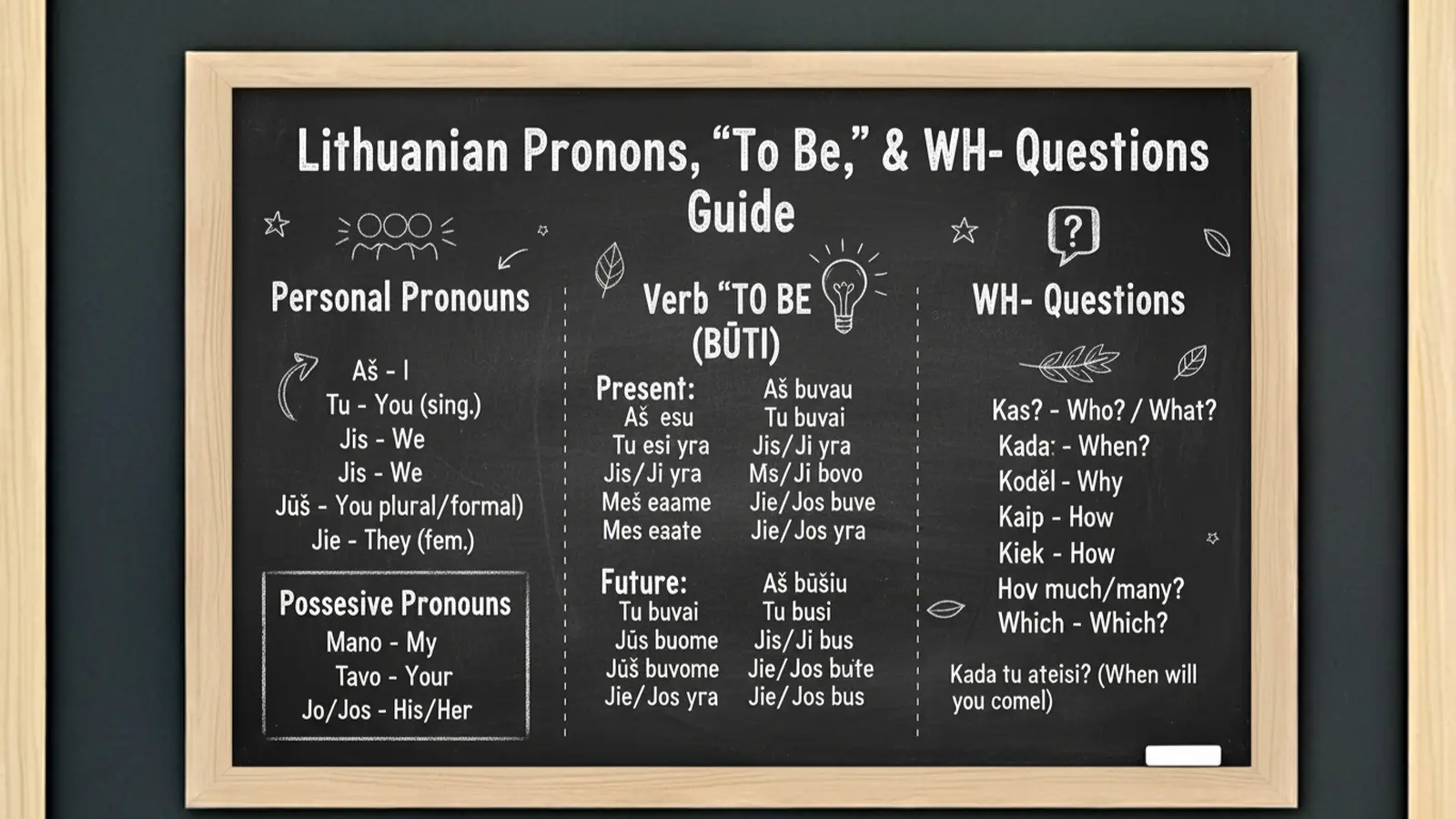3 Minutės
This bilingual lesson covers Lithuanian personal pronouns, the verb "to be" (būti) in the present tense, WH question words, and common question forms with clear examples. Use the clickable Lithuanian text to hear pronunciations (onclick triggers speak(..., 'lt-LT')).
Basic personal pronouns and pronunciation
| English | Lithuanian |
|---|---|
| I | Aš 🔊 |
| You (singular, informal) | Tu 🔊 |
| He | Jis 🔊 |
| She | Ji 🔊 |
| It / This | Tai 🔊 |
| We | Mes 🔊 |
| You (plural / formal) | Jūs 🔊 |
| They (masculine / mixed) | Jie 🔊 |
| They (feminine) | Jos 🔊 |
Verb "to be" (būti) — present tense
Use these forms to say who someone is or what something is.
| English | Lithuanian |
|---|---|
| I am | Aš esu 🔊 |
| You are (singular) | Tu esi 🔊 |
| He is | Jis yra 🔊 |
| She is | Ji yra 🔊 |
| We are | Mes esame 🔊 |
| You are (plural / formal) | Jūs esate 🔊 |
| They are | Jie yra 🔊 |
Common WH question words
| English | Lithuanian |
|---|---|
| Who | Kas 🔊 |
| What | Kas 🔊 |
| Where | Kur 🔊 |
| When | Kada 🔊 |
| Why | Kodėl 🔊 |
| How | Kaip 🔊 |
| How many / How much | Kiek 🔊 |
| Which | Kuris / Kuri 🔊 |
Example questions and translations
| English | Lithuanian |
|---|---|
| What is this? | Kas tai yra? 🔊 |
| Who are you? | Kas tu esi? 🔊 |
| What is your name? (informal) | Koks tavo vardas? 🔊 |
| What is your name? (formal) | Koks jūsų vardas? 🔊 |
| Where are you from? | Iš kur tu esi? 🔊 |
| What time is it? | Kiek dabar valandų? 🔊 |
| Are you a student? | Ar tu esi studentas? 🔊 |
| Do you speak Lithuanian? | Ar tu kalbi lietuviškai? 🔊 |
| How many brothers do you have? | Kiek brolių turi? 🔊 |
Notes and tips
- Formal vs informal: use tu for informal singular you, and jūs for plural or formal address.
- Yes/no questions: you can add ar at the start (e.g., Ar tu esi studentas? 🔊) or simply use rising intonation without ar.
- WH questions usually place the question word first (e.g., Kas tai yra? 🔊 — "What is this?").
- Practice listening and repeating using the clickable Lithuanian phrases to improve pronunciation and rhythm.
Use this page as a quick reference and practice sheet. Repeat each Lithuanian phrase aloud after listening, and try substituting nouns and names to form your own questions.


Palikite komentarą